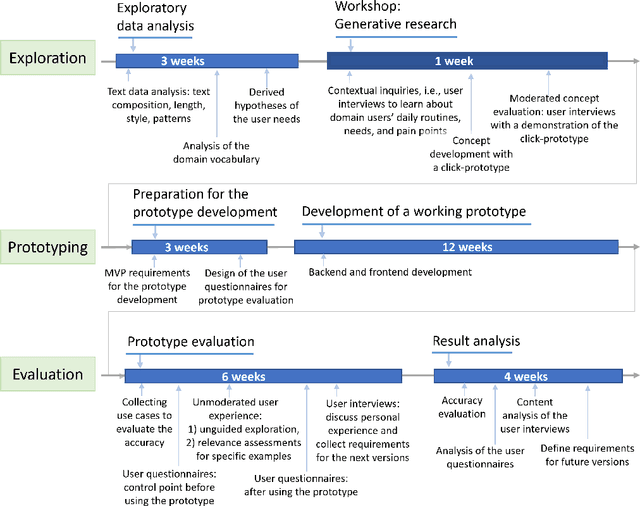Christian E. Matt
Contrastive Learning Using Graph Embeddings for Domain Adaptation of Language Models in the Process Industry
Oct 06, 2025Abstract:Recent trends in NLP utilize knowledge graphs (KGs) to enhance pretrained language models by incorporating additional knowledge from the graph structures to learn domain-specific terminology or relationships between documents that might otherwise be overlooked. This paper explores how SciNCL, a graph-aware neighborhood contrastive learning methodology originally designed for scientific publications, can be applied to the process industry domain, where text logs contain crucial information about daily operations and are often structured as sparse KGs. Our experiments demonstrate that language models fine-tuned with triplets derived from GE outperform a state-of-the-art mE5-large text encoder by 9.8-14.3% (5.4-8.0p) on the proprietary process industry text embedding benchmark (PITEB) while being 3-5 times smaller in size.
Link Prediction for Event Logs in the Process Industry
Aug 12, 2025Abstract:Knowledge management (KM) is vital in the process industry for optimizing operations, ensuring safety, and enabling continuous improvement through effective use of operational data and past insights. A key challenge in this domain is the fragmented nature of event logs in shift books, where related records, e.g., entries documenting issues related to equipment or processes and the corresponding solutions, may remain disconnected. This fragmentation hinders the recommendation of previous solutions to the users. To address this problem, we investigate record linking (RL) as link prediction, commonly studied in graph-based machine learning, by framing it as a cross-document coreference resolution (CDCR) task enhanced with natural language inference (NLI) and semantic text similarity (STS) by shifting it into the causal inference (CI). We adapt CDCR, traditionally applied in the news domain, into an RL model to operate at the passage level, similar to NLI and STS, while accommodating the process industry's specific text formats, which contain unstructured text and structured record attributes. Our RL model outperformed the best versions of NLI- and STS-driven baselines by 28% (11.43 points) and 27% (11.21 points), respectively. Our work demonstrates how domain adaptation of the state-of-the-art CDCR models, enhanced with reasoning capabilities, can be effectively tailored to the process industry, improving data quality and connectivity in shift logs.
Efficient Domain-adaptive Continual Pretraining for the Process Industry in the German Language
Apr 30, 2025Abstract:Domain-adaptive continual pretraining (DAPT) is a state-of-the-art technique that further trains a language model (LM) on its pretraining task, e.g., language masking. Although popular, it requires a significant corpus of domain-related data, which is difficult to obtain for specific domains in languages other than English, such as the process industry in the German language. This paper introduces an efficient approach called ICL-augmented pretraining or ICL-APT that leverages in-context learning (ICL) and k-nearest neighbors (kNN) to augment target data with domain-related and in-domain texts, significantly reducing GPU time while maintaining strong model performance. Our results show that this approach performs better than traditional DAPT by 3.5 points of the average IR metrics (e.g., mAP, MRR, and nDCG) and requires almost 4 times less computing time, providing a cost-effective solution for industries with limited computational capacity. The findings highlight the broader applicability of this framework to other low-resource industries, making NLP-based solutions more accessible and feasible in production environments.
Automated Collection of Evaluation Dataset for Semantic Search in Low-Resource Domain Language
Dec 13, 2024Abstract:Domain-specific languages that use a lot of specific terminology often fall into the category of low-resource languages. Collecting test datasets in a narrow domain is time-consuming and requires skilled human resources with domain knowledge and training for the annotation task. This study addresses the challenge of automated collecting test datasets to evaluate semantic search in low-resource domain-specific German language of the process industry. Our approach proposes an end-to-end annotation pipeline for automated query generation to the score reassessment of query-document pairs. To overcome the lack of text encoders trained in the German chemistry domain, we explore a principle of an ensemble of "weak" text encoders trained on common knowledge datasets. We combine individual relevance scores from diverse models to retrieve document candidates and relevance scores generated by an LLM, aiming to achieve consensus on query-document alignment. Evaluation results demonstrate that the ensemble method significantly improves alignment with human-assigned relevance scores, outperforming individual models in both inter-coder agreement and accuracy metrics. These findings suggest that ensemble learning can effectively adapt semantic search systems for specialized, low-resource languages, offering a practical solution to resource limitations in domain-specific contexts.
Generative User-Experience Research for Developing Domain-specific Natural Language Processing Applications
Jun 28, 2023



Abstract:User experience (UX) is a part of human-computer interaction (HCI) research and focuses on increasing intuitiveness, transparency, simplicity, and trust for system users. Most of the UX research for machine learning (ML) or natural language processing (NLP) focuses on a data-driven methodology, i.e., it fails to focus on users' requirements, and engages domain users mainly for usability evaluation. Moreover, more typical UX methods tailor the systems towards user usability, unlike learning about the user needs first. The paper proposes a methodology for integrating generative UX research into developing domain NLP applications. Generative UX research employs domain users at the initial stages of prototype development, i.e., ideation and concept evaluation, and the last stage for evaluating the change in user value. In the case study, we report the full-cycle prototype development of a domain-specific semantic search for daily operations in the process industry. Our case study shows that involving domain experts increases their interest and trust in the final NLP application. Moreover, we show that synergetic UX+NLP research efficiently considers data- and user-driven opportunities and constraints, which can be crucial for NLP applications in narrow domains
 Add to Chrome
Add to Chrome Add to Firefox
Add to Firefox Add to Edge
Add to Edge